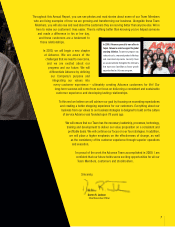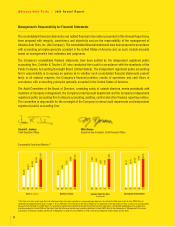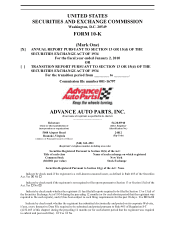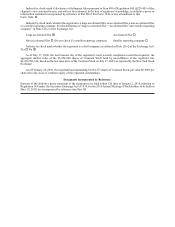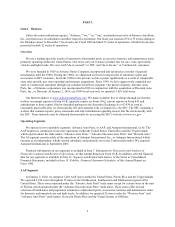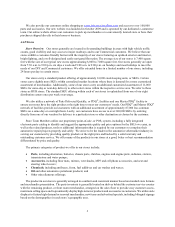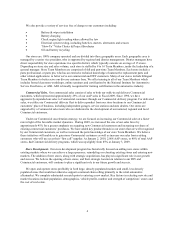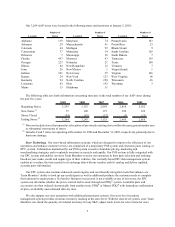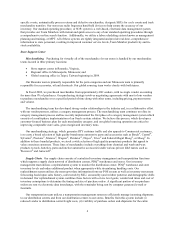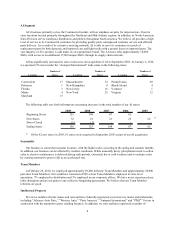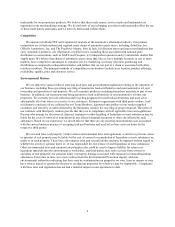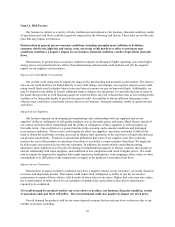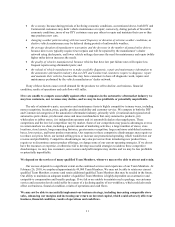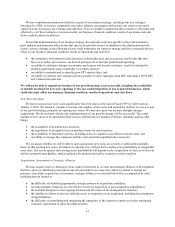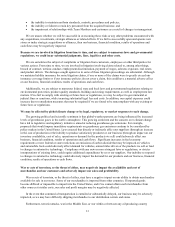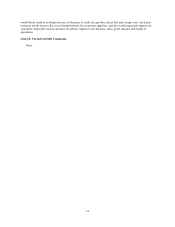Advance Auto Parts 2009 Annual Report Download - page 19
Download and view the complete annual report
Please find page 19 of the 2009 Advance Auto Parts annual report below. You can navigate through the pages in the report by either clicking on the pages listed below, or by using the keyword search tool below to find specific information within the annual report. 6
specific events, automatically process returns and defective merchandise, designate SKUs for cycle counts and track
merchandise transfers. Our stores use radio frequency hand-held devices to help ensure the accuracy of our
inventory. Our standard operating procedure, or SOP, system is a web-based, electronic data management system
that provides our Team Members with instant and quick access to any of our standard operating procedures through
a comprehensive on-line search function. Additionally, we utilize a labor scheduling system known as management
planning and training, or MPT. All of these systems are tightly integrated and provide real-time, comprehensive
information to store personnel, resulting in improved customer service levels, Team Member productivity and in-
stock availability.
Store Support Center
Merchandising. Purchasing for virtually all of the merchandise for our stores is handled by our merchandise
teams located in three primary locations:
• Store support center in Roanoke, Virginia,
• Regional office in Minneapolis, Minnesota; and
• Global sourcing office in Taipei, Taiwan beginning in 2009.
Our Roanoke team is primarily responsible for the parts categories and our Minnesota team is primarily
responsible for accessories, oil and chemicals. Our global sourcing team works closely with both teams.
In Fiscal 2009, we purchased merchandise from approximately 400 vendors, with no single vendor accounting
for more than 9% of purchases. Our purchasing strategy involves negotiating agreements with most of our vendors
to purchase merchandise over a specified period of time along with other terms, including pricing, payment terms
and volume.
The merchandising team has developed strong vendor relationships in the industry and, in a collaborative effort
with our vendor partners, utilizes a category management process. The merchandising team continues to refine its
category management process and has recently implemented the first phase of a category management system which
consists of a multi-phase implementation of an Oracle system solution. We believe this process, which develops a
customer-focused business plan for each merchandise category, and our global sourcing operation are critical to
improving comparable store sales, gross margin and inventory turns.
Our merchandising strategy, which generates DIY customer traffic and also appeals to Commercial customers,
is to carry a broad selection of high quality brand name automotive parts and accessories such as Bosch®, Castrol®,
Sylvania®, Prestone®, Monroe®, Wagner®, Purolator®, Dayco®, Trico® and Federal-Mogul Moog®, or Moog®. In
addition to these branded products, we stock a wide selection of high quality proprietary products that appeal to
value conscious customers. These lines of merchandise include everything from chemical and wash-and-wax
products to tools, batteries, parts and interior automotive accessories under various private label names such as
Wearever® and Autocraft®.
Supply Chain. Our supply chain consists of centralized inventory management and transportation functions
which support a supply chain network of distribution centers, PDQ® warehouses and stores. Our inventory
management team utilizes a replenishment system to monitor the distribution center, PDQ® warehouse and store
inventory levels and orders additional product when appropriate while streamlining handling costs. Our
replenishment system utilizes the most up-to-date information from our POS system as well as inventory movement
forecasting based upon sales history, sales trends by SKU, seasonality (and weather patterns) and demographic shifts
in demand. Our replenishment system combines these factors with service level goals, vendor lead times and cost of
inventory assumptions to determine the timing and size of purchase orders. A significant portion of our purchase
orders are sent via electronic data interchange, with the remainder being sent by computer generated e-mail or
facsimile.
Our transportation team utilizes a transportation management system to efficiently manage incoming shipments
to our distribution centers and from our distribution centers to our stores. Benefits from this system include (i)
reduced vendor to distribution center freight costs, (ii) visibility of purchase orders and shipments for the entire


